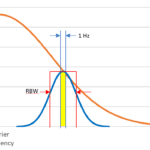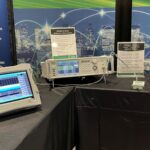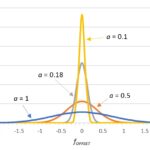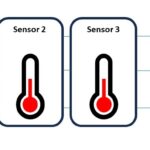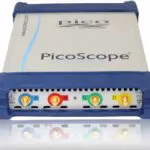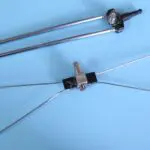Phase noise requires more than one instrument unless you use a phase-noise analyzer.
Featured
AOC 2023: Exhibits show the latest in military wireless
Washington — The Association of Old Crows (AOC) held its 60th annual convention in Washington during the week of December 11, 2023. EE World was there on December 12. Here is some of what we saw in the exhibit hall. AOC is a defense-oriented conference that focuses on military wireless communications. In addition to product […]
TinySA Ultra: A low-cost spectrum analyzer that fits in your pocket
This palm-sized, battery operated instrument can help you diagnose EMC problems.
Product tryout: Tektronix 4 Series B oscilloscope
EE World gets its hands dirty on the latest Tektronix oscilloscope. So many features, so little time. When Tektronix gave the press a preview of the 4 Series B 12-bit mixed-signal oscilloscope and TekScope software, I asked to try the software. Days later, the real thing arrived in a transit case. Fortunately and unfortunately, today’s […]
What is phase noise, and how can I measure it? part 1
Phase noise is an artifact of a nonideal oscillator and is best investigated in the frequency domain. Phase noise accompanies the generation of any real-world sinusoidal signal. You can think of it as the analog equivalent of digital jitter, which we covered in an earlier series (read part 1 and part 2). Recall that jitter […]
How to test the automotive SENT protocol
Oscilloscopes and dedicated software can help analyze SENT data. In “What is the automotive SENT protocol?” we looked at the Single Edge Nibble Transmission (SENT) protocol, as defined in accordance with the Society of Automotive Engineers (SAE) J2716 standard. We reviewed the SENT message frame, which includes a synchronization/calibration pulse followed by a status nibble, […]
What’s the difference between a USB oscilloscope, spectrum analyzer, and digitizer?
USB oscilloscopes are highly versatile instruments. With the right software, they can perform functions usually reserved for spectrum analyzers and digitizers. In some cases, however, special instruments are needed for optimal results. This FAQ compares the functions of oscilloscopes, spectrum analyzers, and digitizers with USB interfaces. They are called USB devices because they connect to […]
How to use simple antennas for EMI troubleshooting
For general troubleshooting, you can use consumer-grade antennas such as for TV. Pre-compliance tests require calibrated antennas. Antennas are important for capturing radiated harmonic emissions from electronic products. You can use them for simple troubleshooting or for calibrated pre-compliance testing. For troubleshooting purposes, you can use almost any uncalibrated antenna. I’ve even seen engineers use […]
Free drivers connect Tektronix instruments to Python
Tektronix announced an open-source Python instrument driver package for the company’s test instruments. Available at no cost, the package provides you with a native Python user experience for instrument automation. With integration into daily workflows and utilizing it with a preferred Integrated Development Environment (IDE), engineers use features such as auto-complete, precise type hinting, comprehensive […]
Audio analyzer combines analog and digital domains
The APx516B from Audio Precision comes with built-in analog I/O and a slot that adds wired or wireless digital I/O. With so many of today’s devices having audio capabilities, engineeers designing wired or wireless audio into a device need to verify audio quality. Audio Precision, well known for its audio analyzers, has introduced the APx516 […]
